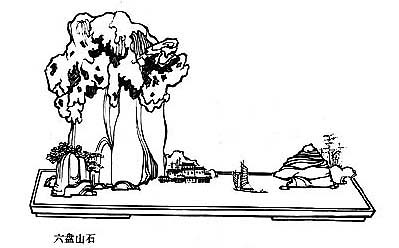論
語
Lun Yu 
 – The Analects of Confucius
– The Analects of Confucius
The Master discusses with his disciples and unveil his preoccupations with society. Tr. Legge (en), Lau (en) and Couvreur (fr).
Lunyu XVII. 21. (468)
The period of three years' mourning for parents; it may not on any account be shortened; the reason of it.
1. Tsâi Wo asked about the three years' mourning for parents, saying that one year was long enough.
2. "If the superior man," said he, "abstains for three years from the observances of propriety, those observances will be quite lost. If for three years he abstains from music, music will be ruined.
3. "Within a year the old grain is exhausted, and the new grain has sprung up, and, in procuring fire by friction, we go through all the changes of wood for that purpose. After a complete year, the mourning may stop."
4. The Master said, "If you were, after a year, to eat good rice, and wear embroidered clothes, would you feel at ease?" "I should," replied Wo.
5. The Master said, "If you can feel at ease, do it. But a superior man, during the whole period of mourning, does not enjoy pleasant food which he may eat, nor derive pleasure from music which he may hear. He also does not feel at ease, if he is comfortably lodged. Therefore he does not do what you propose. But now you feel at ease and may do it."
6. Tsâi Wo then went out, and the Master said, "This shows Yü's want of virtue. It is not till a child is three years old that it is allowed to leave the arms of its parents. And the three years' mourning is universally observed throughout the empire. Did Yü enjoy the three years' love of his parents?"
Legge XVII.21.
Tsai Wo asked about the three-year mourning period, saying, 'Even a full year is too long. If the gentleman gives up the practice of the rites for three years, the rites are sure to be in ruins; if he gives up the practice of music for three years, music is sure to collapse. A full year's mourning is quite enough. After all, in the course of a year, the old grain having been used up, the new grain ripens, and fire is renewed by fresh drilling.'
The Master said, 'Would you, then, be able to enjoy eating your rice and wearing your finery?' 'Yes. I would.' 'If you are able to enjoy them, do so by all means. The gentle- man in mourning finds no relish in good food, no pleasure in music, and no comforts in his own home. That is why he does not eat his rice and wear his finery. Since it appears that you enjoy them, then do so by all means.
After Tsai Wo had left, the Master said, 'How unfeeling Yu is. A child ceases to be nursed by his parents only when he is three years old. Three years' mourning is observed throughout the Empire. Was Yu not given three years' love by his parents?'
Lau [17:21]
Tsai Ngo interrogeant Confucius sur le deuil de trois ans, dit : « Une année est déjà un temps assez long. Si l'homme honorable s'abstient d'exécuter les rites durant trois années, ces derniers tomberont en désuétude ; s'il abandonne la musique pendant trois années la musique sera en décadence. Dans le courant d'une année, les grains anciens sont consumés, les nouveaux sont recueillis ; les vrilles de différentes sortes de bois ont tour à tour produit du feu nouveau. Il convient que le deuil ne dure pas plus d'un an. »
Le Maître répondit : « Au bout d'un an de deuil, pourrais-tu bien te résoudre à manger du riz et à porter des vêtements de soie ? – Je le pourrais », dit Tsai Ngo. « Si tu le peux, reprit Confucius, fais-le. L'homme honorable, en temps de deuil, ne trouve aucune saveur aux mets les plus exquis, n'aime pas à entendre la musique, et ne goûte à aucun repos dans ses appartements ordinaires1. Aussi ne le ferait-il pas. Pour toi, si tu peux te résoudre à le faire, fais-le. » Tsai Ngo se retirant, le Maître dit : « Iu n'est pas pleinement humain. Les parents portent leur enfant sur leur sein durant trois années ; c'est pourquoi le deuil de trois ans a été adopté partout. Iu n'a-t-il pas été l'objet de la tendresse de ses parents durant trois années ? » Les Anciens tiraient le feu nouveau d'un instrument de bois qu'ils faisaient tourner comme une tarière. Le bois employé, était, au printemps, l'orme ou le saule ; au commencement de l'été, le jujubier ou l'abricotier ; vers la fin de l'été, le mûrier ordinaire ou le mûrier des teinturiers ; en automne, le chêne ou le ion ; En hiver, le sophora ou le t'an. Un fils, après la mort de son père ou de sa mère, durant trois ans, ne prenait qu'une nourriture grossière, portait des vêtements de chanvre, et couchait sur la paille, la tête appuyée sur une motte de terre. (Tchou Hsi)
Couvreur XVII.20.

The Analects of Confucius – Lun Yu XVII. 21. (468) – Chinese on/off – Français/English
Alias the Lunyu, the Lun Yü, the Analects, les Entretiens du maître avec ses disciples.
The Book of Odes, The Analects, Great Learning, Doctrine of the Mean, Three-characters book, The Book of Changes, The Way and its Power, 300 Tang Poems, The Art of War, Thirty-Six Strategies
Welcome, help, notes, introduction, table.
Index – Contact – Top























